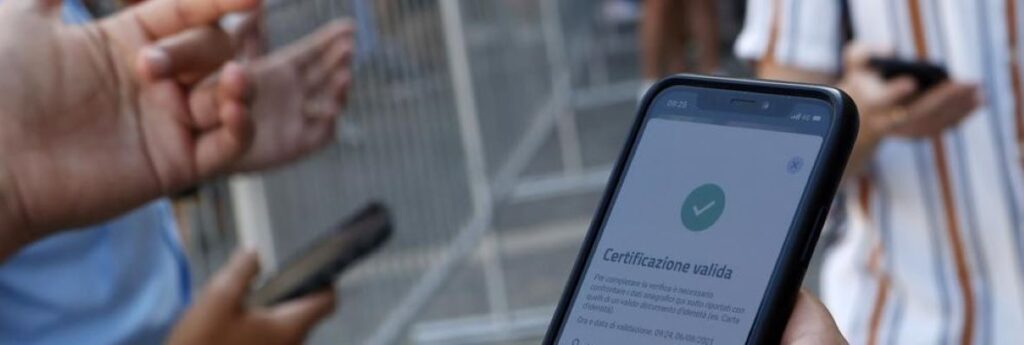Pompeii’s archaeological park is offering free swab tests, the Vatican Museums posted refund instructions, and tourists whipped out smart phones to show QR codes along with admission tickets on the weekend as a new COVID-19 certification rule took effect in Italy as part of the government’s plan to rein in a summer surge in infections.
A so-called “Green Pass” is now required to enter archaeological sites, gyms, theatres, indoor pools and the indoor sections of restaurants, bars, and cafés. To obtain a certificate, individuals must show they have received at least one dose of a coronavirus vaccine approved for use in the European Union, recovered from COVID-19 in the past six months, or have negative lab results from a test done within the previous 48 hours.
And starting Sept. 1, obligatory certification obligatory will be required for those taking flights, high-speed or inter-regional trains, or ships sailing between regions.
The government announced the rule on July 22 and some 50 million of Italy’s 60 million residents had downloaded the certification by late July.
Vaccine certificates issued by the United States, Canada, Japan, and Israel are accepted for tourists arriving from those countries.
Along the sidewalk flanking Vatican City’s walls, visitors to the Vatican Museums – one of the world’s most popular attractions – got ready to show their cellphones with their QR certificates to staffers at the entrance. The line moved briskly.
Visitors from France found the new Italian system familiar. Their country has already introduced entrance requirements even tougher than Italy’s since they also apply to outdoor dining.
“It is good for everybody’s safety. It is positive for the economy, too,″ French tourist Alexine Prentignac said.
While many find it convenient to flash their Green Pass on a phone, paper certification is acceptable in Italy. The Vatican Museums website cautioned visitors to have an identity document handy so staff could “verify actual ownership” of the Green Pass. For anyone unwilling or unable to comply, the website offered instructions on how to request a ticket refund.
At Pompeii, one of Italy’s most-visited tourist sites, officials teamed up with the city of Naples to offer coronavirus tests during the opening hours of the sprawling park featuring the ancient Roman city’s ruins. For now, the tests are being given on an experimental basis, free-of-charge.
During a global emergency like the pandemic, “it’s the task of those who manage a culture site to reconcile as best as possible the needs of health and public safety with our mission to be an inclusive place,″ accessible to all, said Pompeii’s director general, Gabriel Zuchtriege.
Business owners quickly wove the change into their customer routines. Fabrizio De Falco, the owner of a café near St. Peter’s Basilica with both an outdoor terrace and indoor tables, also regarded it a necessary adjustment during the pandemic.
“It is one more duty. It is an additional workload, but it is worth it if it will get us out from this situation,″ said De Falco.
The Green Pass rule applies to those 12 or older, since children under that age aren’t eligible to receive a COVID-19 vaccine in Italy.
France
Meanwhile, France followed suit by requiring people – also including tourists – to show a QR code proving they have a special virus pass before they can enjoy restaurants and cafés or travel across the country.
As of Monday, the pass is now required on high-speed, intercity and night trains, which carry over 400,000 passengers per day in France, Transport Ministry chief Jean-Baptiste Djebbari said Monday. It is also required on long-distance travels by plane or bus. Paper or digital documents are accepted.
The special pass is issued to people who are vaccinated against COVID-19 or have proof of a recent recovery from the virus or who have a recent negative test. The measure is part of a government plan to encourage more people to get a COVID-19 vaccine shot and slow down a surge in infections, as the highly contagious delta variant now accounts for most cases in France. Over 36 million people in France, or more than 54% of the population, are fully vaccinated.
“We’re going to enforce massive controls,” Djebbari said.
The virus pass has already been in place for last month for cultural and recreational venues including cinemas, concert halls, sports arenas, and theme parks.

